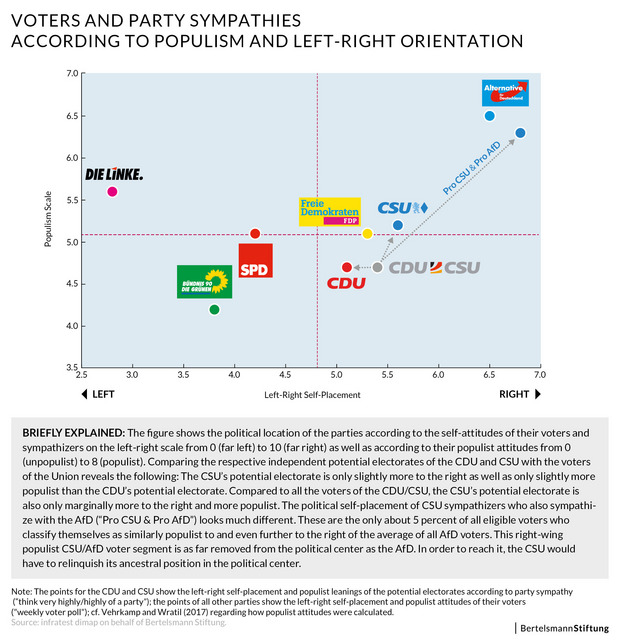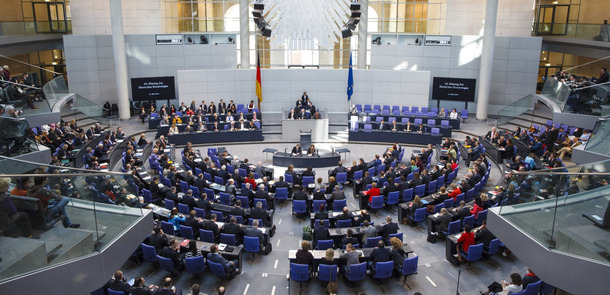Would a national CSU be able to compete better against the AfD?
Germany's established political parties are searching for strategies to counter right-wing populism. This also holds true for the CSU. While doing so, the CSU shouldn't overlook the fact that the AfD is a party on the right-wing populist margin. Whoever emulates them could end up there, as well. This is shown by our analysis of potential electorates in the new "EINWURF."
The Union, made up of the national Christian Democratic Union (CDU) and the Bavaria-only Christian Social Union (CSU), sees itself as the strongest force of the political center. This also applies to the CSU. Roughly eight in ten (81 percent) of its potential voters view themselves as being centrist and unpopulist on the political spectrum, like those of the CDU, and reject the Alternative for Germany (AfD).
In contrast, the AfD is a party on the right-wing populist margin. Its potential electorate views itself as being much more populist than and further to the right of the vast majority of all eligible voters. To reach this voter segment, a national CSU would have to present itself as being much more right-wing, populist, anti-European, anti-globalization and anti-migration than the political center.
For this reason, the German example, as well, shows that emulating and adopting right-wing populist positions and rhetoric primarily helps the populists. A strategy of unpopulist problem-solving, combined with a clear stance of differentiation, would be much more promising.
Right-wing populists are shifting the fundamental axes of politics
In many European countries, right-wing populists have shifted the fundamental axes of politics. They determine the agendas, influence the language and rhetoric of public discourse, and increase their reach and voter potential. In Germany, the AfD is also pursuing these goals. And especially regarding migration policy, the established parties are increasingly allowing the AfD to impose the positions, language and framing of the debate.
Behind this is the comprehensible desire – above all of the middle-class, centrist parties – to regain lost voter potential and to oust the AfD as a party far to the right of the middle.
However, the hope of achieving this goal in the short term by embracing and emulating the right-wing populist agenda seems to be of no avail. In any case, to date, not a single promising example of this has been found throughout Europe. On the contrary, adaptation and emulation have increased the salience of the right-wing populists and their agenda, provided them with additional attention and acceptance, and thereby increased their potential electorate.
"Whoever adopts the agenda, positions and rhetoric of the AfD is only helping the AfD achieve its goals.
More promising would therefore be a clear demarcation and isolation of the populists with their (still) very limited voter potential. Such a strategy admittedly doesn't actively recover voters lost to the AfD for the time being. For this reason, it aims at a preventive containment of the right-wing populist potential electorate. And it simultaneously focuses on demarcation instead of emulation, on having one's own stances, values and unpopulist language, including during confrontations with the right-wing populist's coarsening of language. It focuses on stabilizing rather than relinquishing the political center. It protects public discourse from further coarsening. It wins voters over using unpopulist solutions to problems. And it doesn't debase its own solutions through rhetorical submission to a right-wing populist discourse that is unworthy of a democracy.
![[Translate to English:] Reichstag, Bundestag,](/fileadmin/files/_processed_/1/a/csm_658209243Fotolia_128958535_X_6d199959fc.jpg)




